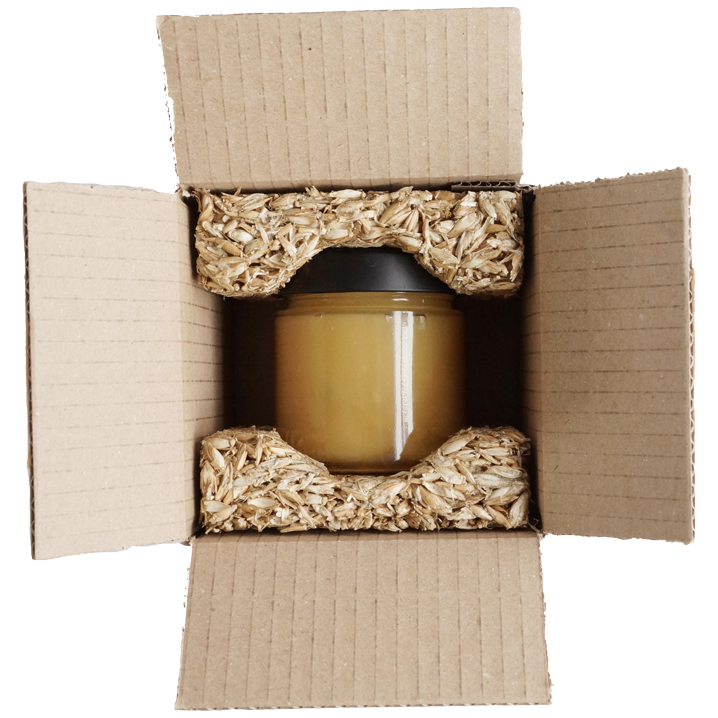28.06.2022 News
Energy Microorganisms Biotechnology/Systems biology
Wacker builds biotechnology center in Munich
The Wacker chemical group is building a new Biotechnology Center in Munich for a double-digit million sum by 2024.
28.06.2022 News
Energy Microorganisms Biotechnology/Systems biology
The Wacker chemical group is building a new Biotechnology Center in Munich for a double-digit million sum by 2024.
01.07.2022 News
Chemistry Waste Materials sciences
A research team from Hanover is developing a wood-plastic composite that will contribute to the circular economy.

04.07.2022 Product
unspecific Plants
Not just since Corona has online trade been booming - and so has the demand for packaging and cushioning materials. A nature-based innovation now offers an alternative to conventional cushioning materials and turns the packaging industry into a circular economy.
05.07.2022 News
Chemistry Waste Chemistry
The Leibniz Institute for Catalysis (LIKAT) in Rostock has opened a new facility to perform laboratory chemistry in the kilo range.
05.07.2022 Country
unspecific unspecific Bioökonomie mitgestalten
The westernmost country in South America is rich in bioresources, is a globally important agricultural and food producer, and has an export-oriented forestry industry. The biotechnology sector is on the rise. While there is no explicit bioeconomy strategy, a number of policies are relevant to the biobased economy.
06.07.2022 News
Agriculture and forestry Plants Biotechnology/Systems biology
The water dependence of plants and ecosystems as a result of climate change will increase significantly in some regions, according to a new study.
01.07.2022 Studies and statistics
unspecific unspecific Biodiversity
Economists at the Finance for Biodiversity (F4B) Initiative warn in a study that the loss of biodiversity could severely damage the revenue streams of many countries.
11.07.2022 News
unspecific Plants Materials sciences
Natural fiber-based organic sheets are expected to make the housings of e-bike batteries lighter.
12.07.2022 News
Agriculture and forestry Plants Agriculture sciences
Using corn straw and the blight fungus Ustilago maydis, researchers want to create an oil that can replace palm oil.
13.07.2022 Success story
unspecific Microorganisms Biotechnology/Systems biology
A new purification process promises environmentally friendly extraction of proteins for the food and pharmaceutical industries.
18.07.2022 News
Chemistry Microorganisms Chemistry
BASF Care Creations has developed two new cosmetic active ingredients based on probiotics.
20.07.2022 News
Construction Plants Agriculture sciences
The University of Göttingen has signed an exclusive licensing agreement with Munich-based start-up Smarter Habitat to produce building materials from popcorn granules.
15.07.2022 News
Food Fungi Biotechnology/Systems biology
Mushlabs and Bitburger are expanding their partnership: The biotechnology start-up will use brewery residues as raw materials to feed the fungal mycelia, which in turn will be used to produce new foods.
25.07.2022 News
Chemistry Microorganisms Biotechnology/Systems biology
France's Carbios joins forces with PUMA and other sporting goods and apparel companies to establish a biotech-based circular economy in the textile industry.
26.07.2022 News
Food Waste Nutritional sciences
Researchers want to replace sugar in ice cream with dietary fiber from food production by-products.
03.08.2022 News
Food Animals Biotechnology/Systems biology
Researchers in Mainz have developed a model that can be used to modify the texture of vegetarian and vegan sausages to produce the right crunch.
01.08.2022 News
Agriculture and forestry Plants Biotechnology/Systems biology
The Swabian Jura could soon become the Provence of southern Germany: Researchers want to grow lavender here for essential oils and textile fibers.
09.08.2022 News
Agriculture and forestry Plants Agriculture sciences
Active ingredients from medicinal plants such as thyme and chamomile can now be used even more effectively thanks to a new process.
28.07.2022 Studies and statistics
unspecific unspecific unspecific
Earth Overshoot Day 2022 is even earlier than last year. According to calculations by the Global Footprint Network, the world's population would need 1.75 Earths measured by its resource consumption.
08.08.2022 News
Energy Waste Chemistry
A new process improves the economic viability of synthetic fuels from biogenic residues.